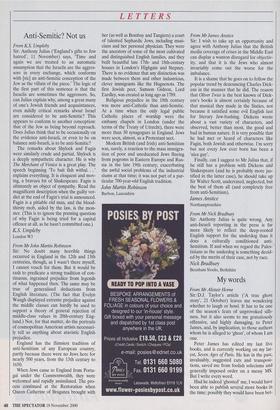From Mr John Martin Robinson Sir: No doubt many horrible
things occurred in England in the 12th and 13th centuries, though, as I wasn't there myself, I cannot vouch for them. But it would be rash to predicate a strong tradition of con- tinuous, ingrained prejudice from legends of what happened then. The same may be true of generalised deductions from English literature. (The fact that Evelyn Waugh displayed extreme prejudice against the middle classes can hardly be used to support a theory of general rejection of middle-class values in 20th-century Eng- land.) Nor, for that matter, do the portraits of cosmopolitan American artists necessari- ly tell us anything about atavistic English prejudice.
England has the flimsiest tradition of anti-Semitism of any European country, partly because there were no Jews here for nearly 500 years, from the 13th century to 1650.
When Jews came to England from Portu- gal under the Commonwealth, they were welcomed and rapidly assimilated. The pro- cess continued at the Restoration when Queen Catherine of Braga= brought with her (as well as Bombay and Tangiers) a court of talented Sephardic Jews, including musi- cians and her personal physician. They were the ancestors of some of the most cultivated and distinguished English families, and they built beautiful late 17th- and 18th-century houses in London's Highgate and Stepney. There is no evidence that any distinction was made between them and other industrious, clever immigrants like the Huguenots. The first Jewish peer, Samson Gideon, Lord Eardley, was created as long ago as 1789.
Religious prejudice in the 18th century was more anti-Catholic than anti-Semitic. At a time when the only legal public Catholic places of worship were the embassy chapels in London (under the terms of the Treaty of Utrecht), there were more than 30 synagogues in England. Jews were seen, almost, as a Protestant sect.
Modern British (and Irish) anti-Semitism was, surely, a reaction to the mass immigra- tion of poor and uneducated Jews fleeing from pogroms in Eastern Europe and Rus- sia in the late 19th century, exacerbating the awful social problems of the industrial slums at that time; it was not part of a par- ticular 700-year-old English tradition.
John Martin Robinson
Barbon, Lancashire


































































































 Previous page
Previous page